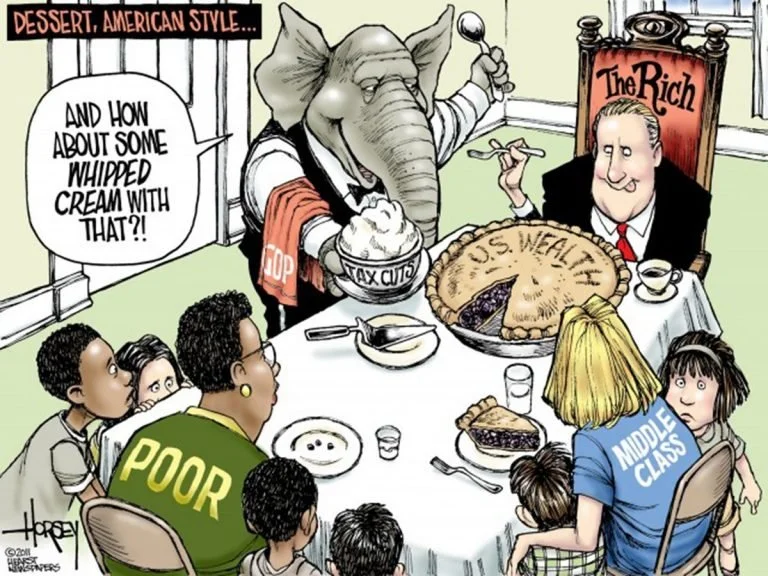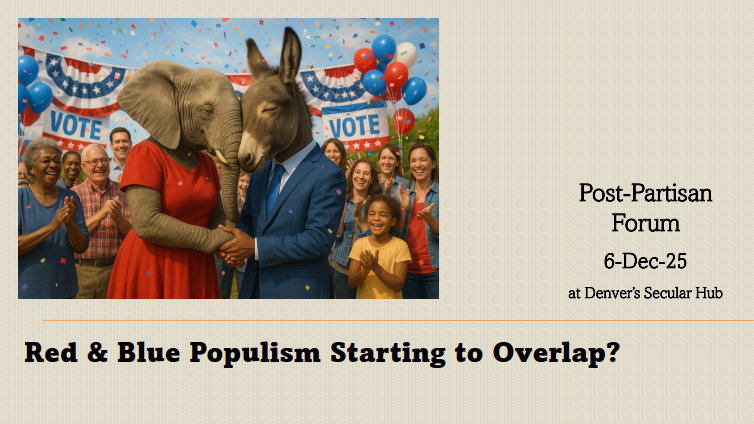The Post-Partisan Forum
Topics (in reverse chronological order) with links to download the slides
Unless announced otherwise, Forums occur 10:00-12:00 the first Saturday of every month at the Secular Hub, 254 Knox Ct, Denver
At the Forum, we tackle questions that unite Americans across the political divide. This month, we ask: Why should we do about taxes?
When billionaires like Buffett, Soros, and Gates publicly decry an unfair tax code, something's clearly broken. Meanwhile, our national debt and debt service costs are spiraling—making the current system not just unfair, but unsustainable.
But before we can demand reform, we should understand the problem. We'll explore three key questions: How unfair is the current tax system to the middle class—and can we quantify it? How did we end up with our current mess? How much time do we have before federal deficits trigger a crisis?
For answers, we'll dig into The Triumph of Injustice by UC Berkeley economists Saez and Zucman—a political history examining the rise of tax avoidance, modern tax havens, and the disappearing contributions of the wealthy ([summary here]). To set the tone, we'll also watch wealthy podcasters laugh about how they avoid taxes and "stick it to the little people" (skip to 1:41:30 here).
Armed with some facts, we can then debate what levels of taxation Americans—red and blue—should demand from our government.
U.S. politics are beginning to change dramatically, creating reasons for hope. The current administration has slipped to only 40% approval (Nate Silver’s poll average, 28-Nov). The independent and minority voters that elected it are starting to drift back to the opposition party. Morale among House Republicans is sinking, and GOP insiders warn that more mid‑term resignations are coming and put their narrow majority at risk (Yahoo News, 24-Nov).
It’s chaos, but history has shown that starting with periods of great turmoil, the America system has often taken great strides in synthesis and reform. Marjorie Taylor Greene’s fascinating resignation speech contained many points that sounded like leftist populism. She even railed against the “political-industrial complex,” accusing corporations and party elites of betraying the American people.
A few days later, several of her points were echoed—perhaps unintentionally—by Cory Booker in an interview with NYTimes. Put their statements side-by-side, and the overlap reveals that compromise and collaboration between Red & Blue is now possible. Both sides are calling attention to affordability, corporate influence, and dysfunction in our political system.
So…as the definitions of conservative and liberal start to blur, can we, the people, take advantage of the political class’s uncertainty? Can we get our representatives to focus at last on numerous policies that a super majority of Americans have long supported?
In this month’s Forum, we’ll use AI to combine the messages from MTG and Booker to synthesize a third way for Americans to consider. We’ll discuss how we voters can and should start nudging, even pushing, our representatives into a red-blue collaboration to break the logjam we’ve had in Washington over the past few decades.
Political scientists increasingly view our nation's drift towards civil war as the result of rural frustration over economic opportunity and structural exclusion. Rural populations view those of us living in the metropole as culprits who have undermined their way of life and stolen their futures. They feel that democracy no longer grants people outside the urban core a voice or dignity and thus decided that nihilism and violence are the only languages that will be heard.
Such analysis poses a host of pressing questions:
Is the urban elite truly responsible for rural decline?
Why does that decline continue?
How should we address the causal conditions in order to avoid a crisis?
Is there time for reconciliation before our country falls over the brink?
Charlie Kirk’s assassination has turned America into a hall of mirrors where we’ve forgotten how mirrors work. Critics who spent years calling for him to be “canceled” are now being canceled for cheering his death, while supporters who defended his right to offend are demanding that others be fired for offending his memory.
An even sadder comedy is watching officials weaponize the very institutions Kirk spent his career critiquing. Federal agencies are policing social-media posts with near-Soviet zeal, the State Department is reportedly yanking visas over tweets, and the Pentagon is “addressing” employees who mock a private citizen’s death—all in the name of a man who warned that government overreach was destroying America.
This spectacle exposes fractures in our democracy that demand scrutiny. At our next forum, the conversation will probe four urgent paradoxes:
How is it that gov’t agencies suddenly stifle speech by corporations and citizens despite 1st Amendment protections?
How could so many America corporations drop their aspirational values the moment they became financially risky?
Why do both camps remain so easily manipulated by simple us-versus-them messaging?
What happens to democracy when economic incentives systematically drive us to betray our cherished principles?
Join us to dissect these contradictions and share strategies for helping Americans see ourselves clearly, recover humility, and step back from this destructive theater of the absurd.
10:00 am Saturday July 5, 2025 @ The Hub
Arguably, America’s political crisis is not a problem of a single party or a particular politician but something deeper. We lack an narrative about our future that’s inspiring enough that Americans will unite, work together, and make it real.
A new generation of aspiring leaders claim they have a narrative that will steer the country in the right direction. Yet they encounter such criticism and resistance from traditional political forces that they feel locked out of the national process.
This month’s Forum seizes upon 33-year-old Zohan Mamdani’s defeat of Andrew Cuomo who is twice his age in the New York city mayorial primary. We’ll ask two vital questions:
· “Does the next generation have a message that can turn this country around?” and, if they do,
· “Can younger politicians overcome the old guard’s grip and place their message on the national stage?”
We’ll start the forum by summarizing a few recent articles, which should give even people who are new to politics plenty to offer as we examine these questions:
NYTimes / NYC Mayoral Race: the message that Mandami used to defeat Curomo
The Nation / Why Bernie Endorsed Mandami: a vital alternative to the billionaire establishment
Ezra Klein / Sarah McBride: how the left lost its focus on the issues that everyday Americans worry about
NYTimes / David Hogg Exits DNC & TruthOut / Hogg Explains Why Dems Losing Voters: how party old-guard stifles new energy
DeepDive / The MAGA Coup: how the Tea Party took over the GOP, but still didn’t solve the problem
Use the link above to download the materials for this event
Will a New Generation of Leaders Save America?
June 7, 2025
American liberalism faces a governance crisis: despite controlling major institutions for decades, progressive policies have failed in many ways to deliver the outcomes Americans need. Housing remains unaffordable, infrastructure projects stall, and bureaucracy frustrates both reformers and citizens.
In response to the Heritage Foundation's "Project 2025," numerous reform "Project 2029" proposals are emerging from think tanks and academics—each offering different visions for America's future. Over the coming months, the Forum will examine these diverse "Project 2029" proposals, evaluating them for reasonableness and their potential to bridge our nation's red-blue divide.
We begin with Klein & Thompson's scholarly bestseller, "Abundance," a critique of present-day liberalism from the left. The authors, both respected policy analysts, argue that recent decades of liberalism gave us a government that has "forgotten how to build the things that people want." Their academic analysis urges removing the barriers erected by past liberal agendas so we can have more housing, more education, more innovations, "more of everything."
Join us for an introduction to this influential work where we will consider the strength of its evidence and the value of its proposed solutions.
At the Forum, we strive for balance and synthesis between viewpoints from the left and right. We begin each session with an AI-generated summary designed to be fact-based and fair to both perspectives—part of our ongoing exploration of how artificial intelligence can enhance civil policy discussions. Those who are curious about this technology are invited to stay afterwards for a brief demonstration
“From Scarcity To “Abundance” -- Re-Orienting Liberalism"
May 3, 2025
The current upheaval in the U.S. government and erosion of civil rights has left many of us wondering how grassroots opposition movements were organized in other parts of the world. Cursory research reveals that they required considerable labor. However, before getting discouraged, people should realize that AI and social media have recently combined to streamline the process. Now a handful of people can accomplish what used to require dozens of volunteers.
Join our May Forum to learn about two examples of how resistance movements that succeeded in locations as disparate as Taiwan and Serbia. Once we have outlined their playbooks, we’ll examine how online democracy platforms such as Polis and large language models can automate the grunt work those two movements had to invest to launch their campaigns. Before breaking into discussion groups, we’ll consider:
· What would an AI platform for democracy look like in mid-2025?
· How might such a platform break the political gridlock of recent decades?
· How can AI facilitate planning, content, recruitment, and funding?
· How would citizens collaborate to build this platform?
We'll envision an artificial intelligence app made by the people and for the people, then discuss what would be the likely next steps for implementating such a system. Never has launching a pro-democracy campaign been easier, so this session may provide new hope to many.
Using AI to Organize An Opposition Movement
March 1, 2025
We see America as now paralyzed across many divides: political, religious, racial, regional. Yet there is one question that unites people across ideological categories. Perhaps it indicates what the real conflict between us must be: Are our institutions fundamentally broken?
Over the past five decades, trust in American institutions has withered. Polls consistently show that confidence in organizations designed to serve and sustain public and democratic life, including government, courts, science, media, and higher education, has waned significantly. Into this climate of distrust, emerges "brokenism" - a new framework for understanding America's deepening divisions that transcends traditional left-right politics. Brokenism suggests our key political divide isn't between conservatives and liberals, but between those who believe our institutions can be reformed and those who believe they must be rebuilt from scratch.
During this month’s Forum, we'll examine how this framework could create political opportunities for greater national cohesion that transcend the two-party system, allowing new coalitions to form around rebuilding rather than merely reforming. To ensure our discussion remains grounded in real world patterns and democratic values, we also consider warnings from first-hand observes about how populist movements can exploit institutional dysfunction to enable authoritarian takeovers in Russia and Eastern Europe.
In case you'd like to read up on these topics before our discussion, we have a compiled resource of readings and posted them to https://tinyurl.com/2j2t6mef.



